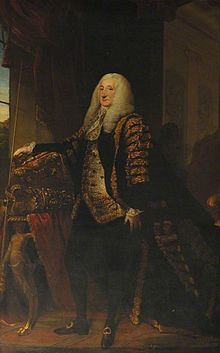Henry Bathurst, 2nd Earl Bathurst
|
The Right Honourable The Earl Bathurst PC KC |
|
|---|---|
 |
|
| Lord Chancellor | |
|
In office 23 January 1771 – 3 June 1778 |
|
| Monarch | George III |
| Prime Minister | Lord North |
| Preceded by | in commission, last held by Charles Yorke |
| Succeeded by | The Lord Thurlow |
| Lord President of the Council | |
|
In office 24 November 1779 – 27 March 1782 |
|
| Monarch | George III |
| Prime Minister | Lord North |
| Preceded by | The Earl Gower |
| Succeeded by | The Earl Camden |
| Personal details | |
| Born | 20 May 1714 |
| Died | 6 August 1794 (aged 80) |
| Alma mater | Balliol College, Oxford |
Henry Bathurst, 2nd Earl Bathurst PC KC (20 May 1714 – 6 August 1794), known as The Lord Apsley from 1771 to 1775, was a British lawyer and politician. He was Lord Chancellor of Great Britain from 1771 to 1778.
Bathurst was the eldest son of Allen Bathurst, 1st Earl Bathurst, and his wife Catherine (née Apsley). Educated at Balliol College, Oxford, he was called to the Bar, Lincoln's Inn, in 1736. He practised on the Oxford circuit and became a King's Counsel in 1745 after several years sitting in King's Bench.
In April 1735 he had been elected member of parliament for Cirencester, and was rewarded for his opposition to the government by being made solicitor-general in 1745 and, then attorney-general to Frederick, Prince of Wales in 1748. Fred died in 1751, but Bathurst was asked to carry on in the same office for Prince George.
Resigning his seat in parliament in April 1754 he was made a judge and bencher of the Court of Common Pleas in the following month. Bathurst remained opposed to the Whigs, despite the ill-fated attempt by the Tories to capitalise from Walpole's fall.
He was admitted to the Privy Council when the death of the Lord Chancellor's death left the post vacant with no candidate. Appointed one of the three commissioners of the Great Seal of England he was favourite for the post and, later allowed as Lord High Chancellor in January 1771; he was on the occasion raised to the peerage as Baron Apsley, in the County of Sussex. He was roundly abused in rhyme and doggerel by satirical writings of Whigs Lord Brougham and Lord Lyndhurst. The best they could say about him was that he was "not disagreeable", but ridiculed his ability at the bar, and mocked a Tory as incompetent. In January 1774 he was instrumental in writing the Intolerable Acts which he supported in parliament and the courts, most notably the Boston Port Act which gave rise to the Boston Tea Party and revolution. The judge was not a war-monger nor had he any experience of soldiering; but perception was political. In 1777 after the American Frigates had defeated once or twice, Bathurst worried that Great Britain might lose her control of the coast line urged peace preliminaries in order to save the colonies in the West Indies. He was a personal friend of Admiral William Howe, who was known to him since boyhood. Having succeeded his father as second Earl Bathurst in September 1775, he resigned his office somewhat unwillingly in July 1778 to enable Lord Thurlow to join the cabinet of Lord North. In November 1779 he was appointed Lord President of the Council, and left office with North in March 1782.
...
Wikipedia
